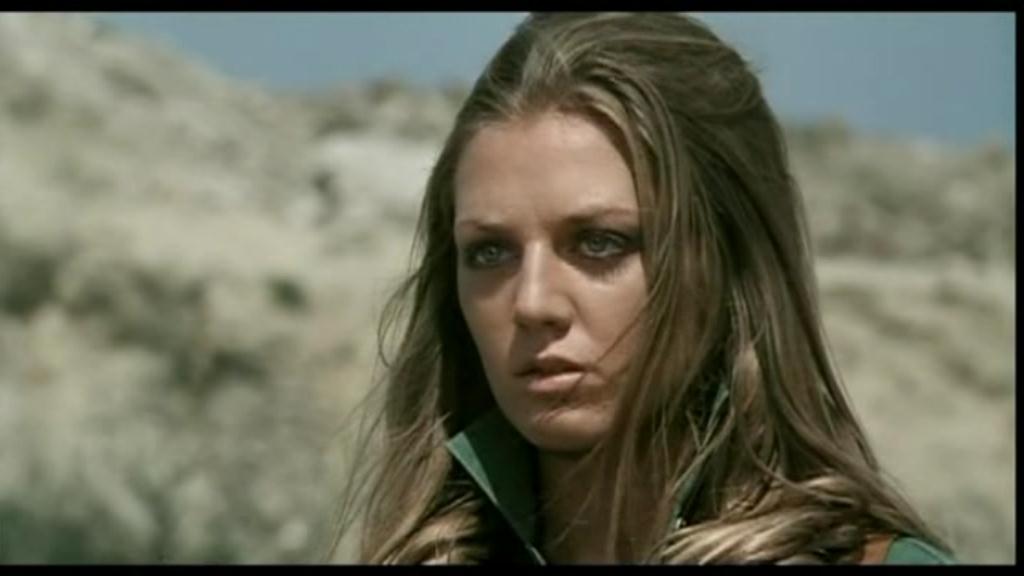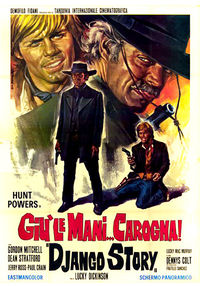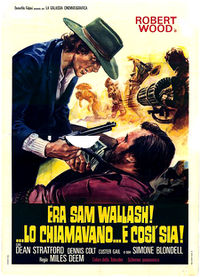One damned day at dawn… an interview with Simone Blondell
by Kevin Grant.
Actually, it wasn’t dawn; it was a good few hours after sun-up. And it was rather a fine day; not maledetto in the least. The 2013 Almería Western Film Festival had finished the night before. I was being driven back to Málaga airport in illustrious company. In the front passenger seat, sweater draped across his shoulders in lieu of a cape or bandolier, was none other than George Hilton, a man I had no qualms about addressing as “una leggenda” (with a wry smile, he had no qualms about assenting). Beside me, attired fetchingly in Stetson and cowboy boots, was the effervescent Simone Blondell – Simonetta Vitelli in a prior existence – fresh from charming the festival as an ambassador for her late father, Demofilo Fidani.
Director, writer, producer, designer… if the auteur theory can be applied to anybody, Fidani is as suitable a candidate as any other. Whatever one thinks of his body of westerns – 13 of them, produced with factory-like regularity over a six-year period – they bear his personal stamp, the mark of a man with a singular vision (and numerous aliases), however eccentric that vision may have been. And after giving the world the likes of Dead Men Don’t Make Shadows and Django and Sartana are Coming… It’s the End (given his tendency to team up heroes, could there be a director’s cut somewhere of Karzan, his jungle romp, in which Django comes out swinging in the last reel?), he found a second life – an afterlife, in a sense – as a spiritualist of some repute. A fascinating character all round.
And who better to provide insight into Fidani’s world, and his way of making westerns, than his daughter, who acted in most of them, almost invariably as a damsel in distress. When we arrived at the airport after that three-hour drive across southern Spain, I asked her, in pidgin Italian, if I could send her questions via email about her career and that of her father. Enjoy… my interview with Simone Blondell:
Your father is well known for using lots of pseudonyms – did he choose the name Simone Blondell for you?
Simone Blondell: Yes, he chose my name. He liked an actress named Joan Blondell very much, and said that I resembled her a little.
How did your parents get started in the film business?
SB:Demofilo was a painter and began working in cinema as a set designer. My mother also painted; then she began working as a costume designer with him. At that time, many people were making westerns. They also decided to try to make one, as producers. When the first one went well, they continued.
Was it always your dream to be an actress?
SB: It all started as a game. I wanted to be a ballerina; then, after shooting my first small scenes, I became passionate about it. I would have loved to do great things but, at the beginning, my parents were very protective towards me and I worked only in their films or those of friends.
Was your father a fan of westerns?
SB: He loved the western genre, but above all he loved cinema.
His films were obviously made on low budgets. Is it true that he would sometimes shoot scenes for different films at the same time? What other ways did he find to save money?
SB: True, he didn’t have enough money to be able to make “a good film”, and he succeeded more than once in making two movies with the material for one, adding scenes to tie up the story. The crew was almost always composed of friends and relatives, and therefore ready to help him in his requests. He was also very well liked by stuntmen, who were grateful to him for always giving them work in his films; some of them got small roles as actors, something they had never done before. He never promised what he could not give, but was always ready to add an extra “gift” to their salary. He managed to exploit the same location several times using his artist’s eye. The secret was to make the most of the day on the set.
How long did an average Demofilo Fidani western take to make?
SB: Around 20 days.
Did your father always follow a script, or did he like to improvise? Would he listen to actors’ advice?
SB: Yes, he followed the screenplay. He accepted advice during preparation – from my mother, from Ettore Manni or other friends – but most of the time he had, and followed, his own ideas.
You worked with some very macho actors – Jeff Cameron/Nino Scarciofolo, Anthony Steffen, Fabio Testi – and your father employed many stunt men. How does a woman cope in such a masculine environment?
SB: I was very “protected”. It was very comfortable for me; they were always nice to me. I got on very well with the stuntmen; I felt like a queen.
You co-starred with Klaus Kinski in Per una bara piena di dollari (A Coffin Full of Dollars). He was notorious for chasing women – did he give you any problems?
SB: He was always kind to me. At that time he had a girlfriend and, when he had finished shooting his scenes, he would go to his trailer with her.
The same actors and technicians worked with your father time and again – how did he inspire such loyalty?
SB: The set was like one big family, where you worked hard but also laughed and joked. Many times in the evening we dined together or we saw each other outside of work. This meant that we established relationships which were not only based on work. Also because Demofilo had great charisma.
Several Fidani westerns were filmed at Gordon Mitchell‘s Cave Film Studio. What was he like off-screen?
SB:Gordon was a wonderful, kind, good person. It was impossible not to get on well with him. He was always available to help. Working with him was great. He gave me advice; gave me courage when I felt insecure. He was always smiling, both on the job and off the set. He was a friend.
How much input did you have into your characters? In most of your westerns you were kidnapped, beaten or tied up – almost as if your father was trying to tell you something - but your characters also had great spirit; they were not weak women…
SB: Female roles in westerns are very limited; there was not much of a choice. I have always been a little rebellious; perhaps unconsciously my father wanted to “punish me”, but my kicks and punches to the poor stuntmen were real and I had great fun defending myself.
Critics were not kind to your father – how did he handle criticism?
SB: I think that nobody likes bad criticism, but, being the intelligent man that he was, he knew very well that his films were respectable even if they were made with very little money. If he had had a large budget, I think he would have made a fine film.
Is he best remembered in Italy today as a medium or as a film director?
SB: They are two completely different worlds. Perhaps today more as a medium, also because he wrote three books on the subject with my mother.
You stopped acting in the mid-Seventies – why was this?
SB: My last work was a very important commercial [for Vespa Piaggio scooters], directed by Tinto Brass for RAI. The era of westerns was finished and in Italy they were only making comedies where women had to undress or at least nudity was seen as something important. I didn’t feel it was a role for me. I tried in the film Il castello delle donne maledette (Frankenstein’s Castle of Freaks), but I didn’t like it. For a brief time I worked as a costume designer and an interior designer, then I got married and at that point I decided that the best role would be that of a mother, and that is what I have done.
Many thanks to Elena Marcarini for her help with translation of the interview with Simone Blondell!












